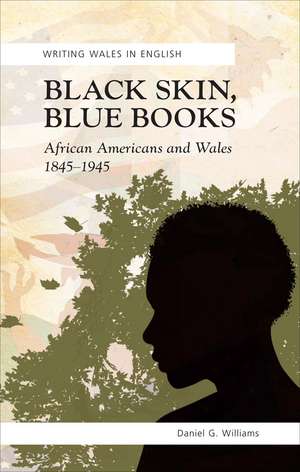Black Skin, Blue Books: African Americans and Wales 1845-1945: University of Wales Press - Writing Wales in English
Autor Daniel G. Williamsen Limba Engleză Paperback – 15 noi 2012
Black Skin, Blue Books is a major contribution to the field of comparative transatlantic studies, as it analyzes the ways in which African Americans and the Welsh have defined themselves as minorities within larger nation states. This volume examines friendships and cultural exchanges between African Americans and the Welsh, such as actor Paul Robeson’s connections with socialists in Welsh mining communities and novelist Ralph Ellison’s stories about his experiences as a GI stationed in wartime Swansea. Offering insights into national and ethnic identity, this wide-ranging book draws on literary, historical, visual, and musical sources to open new avenues of research in Welsh and African American studies: nationalism and assimilationism, religion and secularism, language and race, and cultural identity and political citizenship.
Preț: 146.74 lei
Nou
Puncte Express: 220
Preț estimativ în valută:
28.08€ • 29.39$ • 23.37£
28.08€ • 29.39$ • 23.37£
Carte disponibilă
Livrare economică 10-24 martie
Livrare express 22-28 februarie pentru 29.80 lei
Preluare comenzi: 021 569.72.76
Specificații
ISBN-13: 9780708319871
ISBN-10: 0708319874
Pagini: 357
Dimensiuni: 140 x 216 x 30 mm
Greutate: 0.48 kg
Editura: University of Wales Press
Colecția University of Wales Press
Seria University of Wales Press - Writing Wales in English
ISBN-10: 0708319874
Pagini: 357
Dimensiuni: 140 x 216 x 30 mm
Greutate: 0.48 kg
Editura: University of Wales Press
Colecția University of Wales Press
Seria University of Wales Press - Writing Wales in English
Notă biografică
Daniel G. Williams is a senior lecturer in English and the director of the Richard Burton Centre for the Study of Wales at Swansea University.
Cuprins
General Editor's Preface
Acknowledgements
Illustrations
Introduction
1. Black Skin, Blue Books: Frederick Douglass, Abolitionism and Victorian Wales
2. 'In the Wide Margin': Modernism and Ethnic Renaissance in Harlem and Wales
3. 'They feel me a part of that land': Paul Robeson, Race and the Making of Modern Wales
4. The Invisible Man's Welsh Routes: Ralph Ellison in Wartime Wales
Conclusion: 1945
Notes
Bibliography
Index
Acknowledgements
Illustrations
Introduction
1. Black Skin, Blue Books: Frederick Douglass, Abolitionism and Victorian Wales
2. 'In the Wide Margin': Modernism and Ethnic Renaissance in Harlem and Wales
3. 'They feel me a part of that land': Paul Robeson, Race and the Making of Modern Wales
4. The Invisible Man's Welsh Routes: Ralph Ellison in Wartime Wales
Conclusion: 1945
Notes
Bibliography
Index
Recenzii
“The connections between the slave trade and its abolition in the United States and England have been amply documented. Those between African Americans and Celtic peoples and cultures, however, remain under-explored. Black Skin, Blue Books begins with a comparative chapter on the Victorian era in Wales and African America, before moving on to modernism and to the connections between Paul Robeson, Ralph Ellison, and the Welsh. It fills a void that most of us did not even know existed! This compelling and well-researched book is a major, fresh contribution to Black Atlantic Studies.”
“Daniel G. Williams’s Black Skin, Blue Books is written with grace and uncommon insight. It is a model for transnational scholarship that opens up a new tributary of literary connection. By exposing moments of ‘contact and comparison’ between the literatures of black America and of Wales, Williams offers up surprising and necessary insights that defy our assumptions about race, place, and nation. I can think of few books that better illustrate the capacity of authors from very different parts of the world to arrive at what Ralph Ellison once termed ‘those abiding patterns of experience’ that help to define our shared sense of humanity.”
“Daniel G. Williams explores passionately what at first blush seem like strange bedfellows—African Americans and the Welsh—until one dips inside this surprising book. Emerging from its pages is an intertwined but twisted history of struggle against discursive imperialism over centuries of misunderstanding and misapplied notions of who is literate, who is human. Williams reveals that African American and Welsh literary politics are not only connected by a discourse of Blackness, but by Welsh and Black performative traditions.”





















